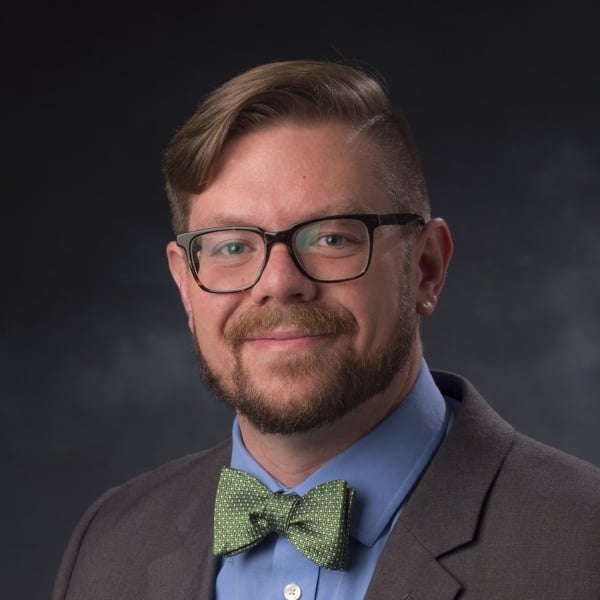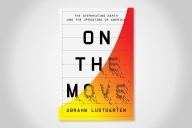You have /5 articles left.
Sign up for a free account or log in.
Christopher Haynes is a principal program implementation manager at Coursera, which entails working with colleges and universities to design and launch online degree programs. Chris graciously agreed to share the story of how his Ph.D. led him to ed tech.

Q: Tell us about what the job of principal program implementation manager is all about. How would you describe your role?
A: In the simplest terms, my job is project management. I help coordinate teams of dedicated professionals—at our partner universities and internally at Coursera—to design, develop and launch online degree programs out into the world. But as your readers know, online degree programs are not simple projects! There are strategic, pedagogical, commercial and operational dimensions to online degrees, and the implementation manager’s job is to orient and align these dimensions from ideation to launch.
While the launched online degree is the most visible output of my role, what’s most interesting about my job is captured in the name of my team at Coursera: partner enablement. Our mandate is to be creative problem solvers who unlock, unblock and accelerate our partners’ ambitions and vision for transformative online education. Whether that’s bringing together institutional coalitions to design and implement performance-based admissions pathways or working with an individual faculty member to solve for designing group projects online and at scale, folks on my team are there in the trenches.
For me, this job is about bringing all of my experiences in higher education to bear—teacher, researcher, administrator, developer and designer—to help partners connect their faculty with the millions of needful learners out there ready to develop their skills, enhance their foundational knowledge and get to the next step in their careers.
Q: What was the path that brought you from a Ph.D. in English language and literature from CU Boulder to your position at Coursera? How does the disciplinary-specific academic training you received relate to the work you are doing now?
A: I love this question, because I often have to tell myself the story again and again to make sure I understand how this happened! I began my academic journey as a medievalist, researching early English mystical and devotional literature. It was all parsing Middle English and tracking down references in obscure personification allegories … don’t worry, I’ll skip the details! I was chugging along through a doctoral program when two important events occurred: first, I became a parent; second, I applied for and won a digital pedagogy grant that funded development and delivery of online courses.
I’ll be honest with you—initially I saw the latter as a means to an end: teaching online and not coming to campus meant getting to spend more time at home with my newborn child. But it very quickly became much more than that. Self-study in learning design and an expanding network of online pedagogues led to additional projects advising other teachers on the principles and foundations of online teaching and learning. It was a really transformative time for me and radically changed my relationship to academe.
So, I had a choice to make: Do I stay on a path toward an increasingly challenging academic job market, or do I lean into this new path that had so revitalized my teaching practice and expanded my professional horizons? Reader, I chose the latter.
I wove my research on digital pedagogy into a revised dissertation project, where I argued that literary history and humanities education have always grounded themselves in the relationships between people and technology—whether that technology is a book or a MOOC. I honed my faculty development skills and my training as a learning designer. Ultimately, I found myself in a position to join a team at CU Boulder that was figuring out how to design courses for a fully online master’s degree in electrical engineering, to be hosted on the Coursera platform.
As each new challenge emerged, someone had to pull together the right stakeholder groups and figure out which pieces of the system needed to be developed, revised or built from scratch to facilitate getting these online courses out to the learners who needed them. From the technical details of setting up enrollment data flows to the architecture of supporting matriculated online students, I suddenly found myself doing the job of implementation management without the title.
With the implementation work for CU Boulder’s first degree hosted on Coursera finished, I found myself hungry for more. I wanted to bring the energy of online degree implementation—and the empowerment of faculty and learners that came with it—to other colleges and universities. I didn’t have to look too far to find that opportunity. I joined the team at Coursera in the fall of 2021.
At Coursera, I use my academic training every single day. It shows up in my capacity to build empathy based on shared understanding with faculty, staff and administrators at our partner universities and in my deep recognition of the needs and desires of learners who find themselves in need of online educational experiences. I mentioned that the job is project management earlier, but it’s project management in the same way that teaching is, orchestrating a group of (mostly) willing participants toward the execution of a shared, collective goal. It’s immensely gratifying work and my day-to-day remains grounded in the academic and social mission of higher education.
Q: What advice do you have for graduate students or someone who finished a Ph.D. that might be thinking of exploring a career in educational technology or some other nontraditional academic career?
A: The most important piece of advice I can give, and perhaps the most difficult to accept when you’re deep in the vortex of graduate school, is this: permit yourself to imagine a world outside of the traditional paths for which most master’s and doctoral programs prepare you. There are many ways to leverage your skills, your professionalism and your commitment to helping others and discovering new knowledge in ways that further our societal need for accessible and meaningful education and opportunity. I implore you: reflect openly and honestly about what you value and where you think you want to contribute. I also feel strongly that we should acknowledge the shame and the fear that often attends the way these opportunities are discussed in academic departments. When we speak the shame and the fear, we strip them of their power and we open up a space to imagine how things could be different. I had the great privilege of finding a supportive community during my transition to educational technology and I want to say to your readers: reach out to those of us who have followed these paths, ask us questions and start building your network of wider opportunity.








